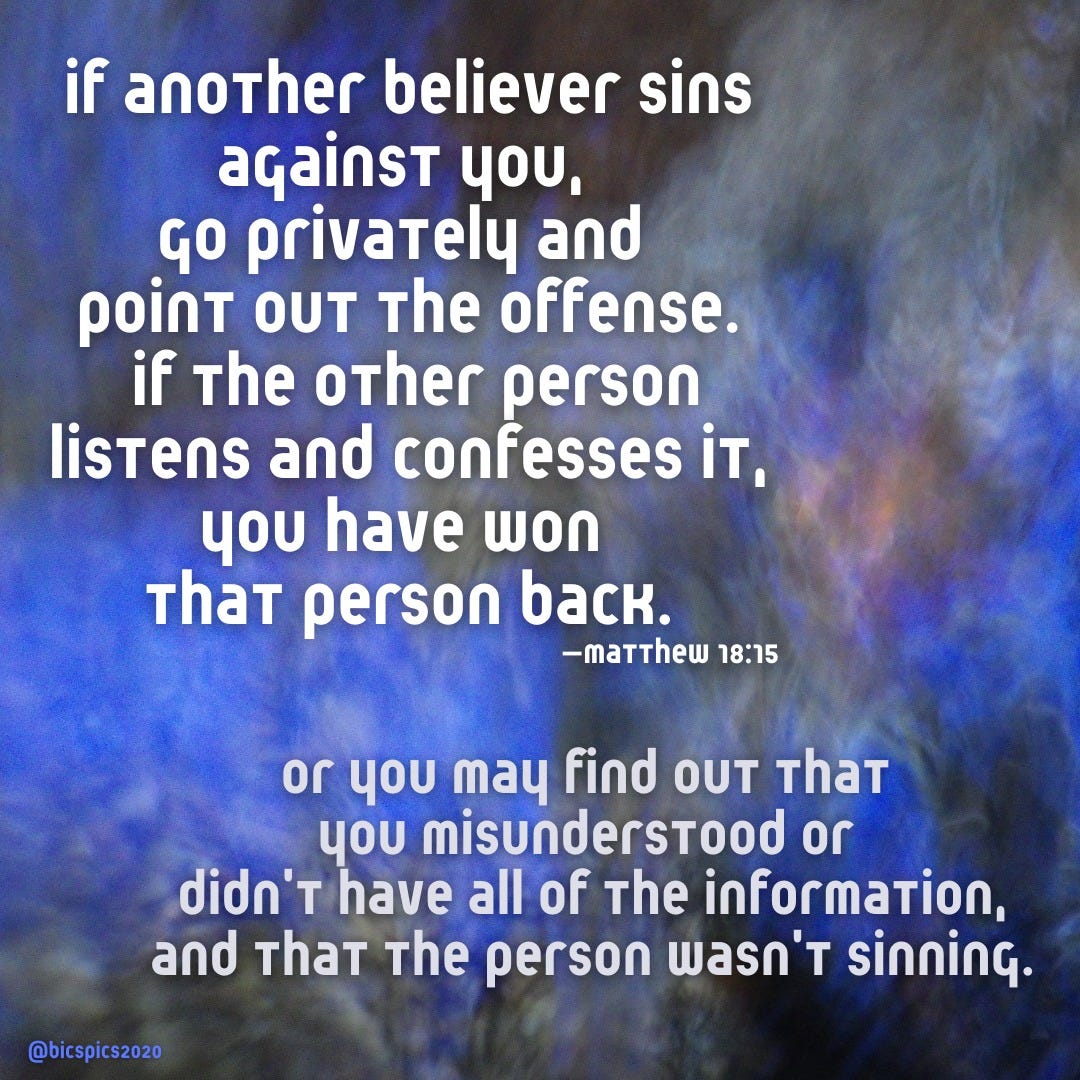Belonging: Where two or three are gathered...
It's not just conflict being handled poorly in the church, it's judgment too.
When I read a few books about church history and the role of women, and then shared some reflections and questions on my social media profiles, I was targeted for this public act.
The funny thing? Those who appeared to have a problem with it mentioned me anonymously or they talked to others about what I had written, [i.e. ‘triangulation’]. They never came directly to me.
In situations such as these, often Matthew 18 is brought up as the solution. In recent years, I’ve seen people reference this passage, but not actually live it out.
15 “If your brother or sister[b] sins,[c] go and point out their fault, just between the two of you. If they listen to you, you have won them over.
Matthew 18:15 HCSB
The thing is, though, Matthew 18:15 reminds us that it’s about confronting a brother or sister’s sin. I don’t believe my reflection was sinful. It was simply wrestling with elements that I had learned within my faith.
What if the act committed is not really a sin? What if it’s misinterpreted? I think there is a passage even before we get to Matthew 18 to address this concern.
“Do not judge, so that you won’t be judged. 2 For with the judgment you use,[a] you will be judged, and with the measure you use,[b] it will be measured to you. 3 Why do you look at the speck in your brother’s eye but don’t notice the log in your own eye? 4 Or how can you say to your brother, ‘Let me take the speck out of your eye,’ and look, there’s a log in your eye? 5 Hypocrite! First take the log out of your eye, and then you will see clearly to take the speck out of your brother’s eye.” Matthew 7:1-6 HCSB
Because of our sinfulness, the temptation to judge is present for the Christian, just like a anyone else. A common bond in Christ doesn’t mean we are free from mishandling life situations.
Matthew Henry says it best in his commentary:
“We must not make the worst of people, nor infer such invidious things from their words and actions as they will not bear. We must not judge uncharitably, unmercifully, nor with a spirit of revenge, and a desire to do mischief. We must not judge of a man’s state by a single act, nor of what he is in himself by what he is to us, because in our own cause we are apt to be partial. We must not judge the hearts of others, nor their intentions, for it is God’s prerogative to try the heart, and we must not step into his throne; nor must we judge of their eternal state, nor call them hypocrites, reprobates, and castaways; that is stretching beyond our line; what have we to do, thus to judge another man’s servant? Counsel him, and help him, but do not judge him.”
Individuals who do not have a relationship with me, took thoughts and reflections I shared publicly as an indictment against their own beliefs. In reality, I was willing to share my wrestling to show others that it’s ok to ask questions of God and dig into the faith He has gifted.
What I am seeing in the public spaces of social media, are fellow Christ followers sharing their faith, their heart, their lament of the brokenness of this world. Others have read these posts, disagreed, and immediately desired to point out “the speck in their brother’s eye.”
How is that the best path? Jesus is pretty clear in both Matthew 7 and 18 of how we are to self reflect and also go directly to the person whose words felt problematic. We should not be hearing about these concerns from anyone other than the individual who disagreed.
The portion of Matthew 18 that we should really be focused on is this:
19 “Again, truly I tell you that if two of you on earth agree about anything they ask for, it will be done for them by my Father in heaven. 20 For where two or three gather in my name, there am I with them.” - Matthew 18:19-20
When two or more individuals meet, God is present. Whether to converse about differences, offer forgiveness, or both, God intended for us to be in relationship with others. He intended us to be in community, because this world will try all the ways to distract us, including judging our brothers and sisters in Christ. Yet, God desires for us to work together towards loving our neighbor, withholding judgement and seeking unity.


Beautiful. What a testament to “walking the walk”.
Amen, Emily! You are courageous in sharing your questions about traditional interpretations of some Bible passages, and I think Jesus would be okay with questions. In fact the Hebrew tradition of learning involved questioning and dialogue.